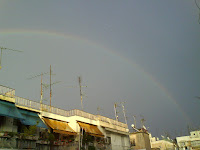
When I first heard of
Kazatzakis' quote "I fear nothing. I hope for nothing. I am free," I wondered why it's made so much of an impression. The first part is certainly brave and impressive; it's admirable to not have fear and it's certainly followed by (and it deserves) freedom. To imply, however, that not only you don't need hope to be free, but that it's an actual obstacle to freedom... it seemed like armchair arrogance in my childish mind. I interpreted the absence of hope as absence of motivation, absence of goals, absence of action, absence of interest.
Back then I had a very close relationship with hope. I hoped with all of my soul, I hoped as much as I could, thinking the intensity of my hoping alone could influence things in my favour. And I hoped and I wished, and I wished and I hoped.
Hoping by hoping, though, I observed at some point that whether I hoped or not was independent to the outcome. Whether I hoped or not did not change the probability of getting heads on a coin toss. The things that I couldn't influence with my actions, I couldn't influence with my hoping; and the materialisation of the things that I could influence with my actions was determined by said actions, not my hoping. This realisation disappointed me greatly, but it didn't stop me from hoping. Hope continued to give me strength; it was my motive, the fuel of my cognitive machine.
However, my hope, apart from useless, it was meant to become a problem, as well. At some point I realised that I was spending more time recovering from hopes that were not vindicated, than enjoying either the vindicated ones or the hopes themselves. No matter how much I tried, I couldn't not get hurt when a hope was proven vain. And the more and/or more often and/or more intensely you hope, the more and/or more often and/or more intensely get disappointed.
Soon, I started worrying every time I felt hope waking up inside me. The idea that I will hope for something that won't happen and I'll be disappointed again was disturbing. It came to a point when I just couldn't handle the prospect of one more homeless hope. How many times to tell yourself, "It's OK, let's move on?" How many times to tell yourself, "It's just one more failure, it'll pass?"

Having been, therefore, imprisoned by my tendency to hope, I thought I figured out why Kazatzakis conceived the absence of hope as freedom; because, as long as I hoped and got disappointed, I wasn't free, but dependent on my fear of getting disappointed again. The idea of forsaking hope, even if it meant (according to my interpretation) I'd fall in inaction and apathy, started to look appealing. It was enough that I would not get disappointed again. So, arm, aim, shoot! The firing squad of the sides of myself set hope up 6 meters away and then buried her 6 feet under, satisfied to go against the popular saying that wants hope to always "die last."
Some time passed that I didn't hope for anything. I existed nice and quitely, without the passions of desire and expectation; and the quiet was welcome after years and years of persistent (and painful) expectation. Along with the quiet, came the inaction. I wasn't trying for anything, I wasn't planning, I wasn't acting. Nothing to made me happy, nothing to made me sad; the absolute balance. Then, I believed I'd found Kazatzakis' freedom.
Without realising how, though, I started taking chances here and there. I started planning, I started acting. I had no hope anymore, but that didn't stop me from setting goals and - after some practice - from doing my best. And then I figured out I'd been mistaken...
It is different to be apathetic than to be indifferent. It's different to hope than to want. I trained myself to want without drowning in my desire, without the anxiety of "Will I succeed or not," "Will it happen or not?" And accepting wanting for what it is, with the knowledge that nothing is certain, I made it to a point where I was indifferent to the outcome, without being apathetic to it. There was no hope, nor did I need it. I wasn't getting disappointed, I wasn't getting excited; nor was I missing the excitement and the disappointment. Methodically, I moved towards what mattered to me. And then I was certain, finally, that I had understood what Kazatzakis meant by claiming freedom comes from the lack of hope.

But that didn't last long. Sooner that I'd wanted, came the time when a wonderful prospect (or, perhaps, the prospect of a wonderful prospect) brought an unexpected resurrection. Hope, like a phoenix, was reborn from her ashes.
I don't know why that happened. I don't know if it's because it had been a long time I'd wanted something so much; if it was the intensity of my desire, that is; or if it's a tendency, human or personal, to hope, that had simply curled up in the darkness, waiting stoically to make it's reappearance when the conditions allowed for it; or if it's just a weakness of mine to apply in pratice what I support in theory.
What I know is that I catch myself hoping again... And what I know is that it changes nothing. What I want is not any more possible or probably because I want it. I'm not trying more or less, better or worse, because I hope. In fact, the only thing I can do is wait, because there's nothing I can do to influence the outcome, anyway. And even so, I hope.
And maybe that doesn't make me free... but it certainly makes me alive.



